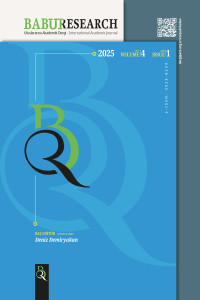Öz
In this article, I examine Ibn Hazm’s aesthetics within the framework of the central problems of the discipline, such as the quiddity of beauty, aesthetic pleasure, aesthetic judgment, and so on. I do this within the investigative framework employed by Kant in his Critique of Judgment, comparing Ibn Hazm’s views with Kant’s. I have observed that Ibn Hazm’s aesthetic views, influenced by the Zahirite school of thought, present a theoretical framework that bears a striking resemblance to that of modern thinkers. Ibn Hazm argues that the supernatural cannot have an aesthetics because it surpasses our capacity for comprehension. The focus of Ibn Hazm’s aesthetics is our senses and the human soul—that is, our subjectivity. Beauty is indefinable both because it is merely an experience of (divine) radiance and because it transcends this subjective experience. The fact that beauty has no specific name to express it and that it is something purely sensed in the soul suggests that Ibn Hazm, like Kant, sees it as something pleasing without a concept, and that characteristic of its pleasure is disinterested. The indefinability of beauty is not only due to it being something felt in our subjectivity but, even more than that, because it is divine —that is, it is the manifestation of God’s name Jamal; beauty is the experience of divine radiance. The seeming similarity between Kant’s and Ibn Hazm’s conceptions of aesthetic taste in terms of quality, quantity, relation and modality exist only at the level of conclusions rather than in their theoretical foundations. Kant’s transcendental philosophy, particularly his concept of a priori limits this similarity. Therefore, establishing a complete parallelism between Kant and Ibn Hazm is epistemologically and metaphysically impossible.
Anahtar Kelimeler
Ibn Hazm Islamic aesthetics beautiful al-Ghazālī aesthetic judgment Kant.
Kaynakça
- Husserl, E. (1968). Logische Untersuchungen I. Tübingen: Max Niemeyer Verlag.
- Ibn Hazm. (1987). Er-Resāʾil: Risālatfī Mudāwāt al-Nufūs (Haz. İ. Abbas). Beyrut: [Yayınevi belirtilmemiş].
- İbn Hazm. (2017). El-Faṣlfī’l-Milel ve’l-Ahvāʾ ve’n-Niḥal: Dinler ve Mezhepler Tarihi (Cilt 3, H. İ. Bulut, Çev.). İstanbul: Türkiye Yazma Eserler Kurumu Başkanlığı Yayınları.
- Kant, I. (1922). Kritik der Urteilskraft. Leipzig: Felix Meiner Verlag.
- Puerta Vílchez, J. M. (2017). Aesthetics in ArabicThought: FromPre-IslamicArabia Through al-Andalus (C. López-Morillas, Trans.). Leiden & Boston: Brill.
Öz
Bu makalede İbn Hazm estetiğini güzelin neliği, estetik haz, estetik yargı vs. gibi disiplinin merkezi sorunları çerçevesi içinde ele almaktayız. Bunu Kant’ın Yargıgücünün Eleştirisi adlı eserinde icra ettiği soruşturma çerçevesi içinde, onun görüşleriyle karşılaştırarak yaptık. İbn Hazm’ın estetik görüşünün zahiri mezhep anlayışının tesiriyle modernlere çok benzer bir teorik çerçeve sunduğunu gördük. İbn Hazm bizim kavrama kapasitemizi aşacağı için doğaüstünün estetiği olamayacağını düşünür. İbn Hazm’ın estetiğinin odak noktası duyularımız ve insan nefsi, yani öznelliğimizdir. Güzellik salt bir (ilahi) ışıma yaşantısı olması cihetiyle ve bu öznel yaşantının fevkinde aşkın bir şey olması cihetiyle de tanımlanamazdır. Güzelliği ifade edecek bir adın olmaması, onun nefislerde salt duyumlanan bir şey olması cihetiyle İbn Hazm’ın onu Kant gibi kavramsız olarak hoşa giden bir şey olarak gördüğünü düşündürtmektedir. Güzelliğin tanımlanamaz oluşu onun öznelliğimizde hissedilen bir şey olmasının yanında ve hatta bundan da öte onun ilahi bir şey olması, yani Allahın cemal isminin tecellisi olması nedeniyledir; güzellik ilahi ışımanın yaşantısıdır. Bu yaşantı her iki cihetten de tanımlamazdır. Ayrıca İbn Hazm aynı sebepten ötürü beğeni yargımızın irademizin üzerinde bir şey olduğuna, yani güzelin zorunlulukla hoşa giden bir şey olduğunu işaret eder. Sonuçta İbn Hazm’a göre, güzelin nitelik açıdan estetik, kavramsız ve metafizik-öznel çıkarsız olarak hoşa giden; nicelik açıdan metafizik-öznel genel-geçerlilikte hoşa giden, ilgi yönünden fıtri çıkarsız olarak hoşa giden, kiplik yönünden metafizik-öznel zorunlulukla hoşa giden bir şey olduğunu savunduk. Ancak bu benzerlik daha ziyade sonuç seviyesinde mevcuttur, teorik temelde değil. Kant’ın transandantal felsefesi, özellikle apriori anlayışı bu benzerliği sınırlamakta, bu yüzden aralarında tam bir paralelizm kurmak epistemolojik ve metafizik açıdan imkansızdır.
Anahtar Kelimeler
Ibn Hazm Islamic aesthetics beautiful al-Ghazālī aesthetic judgment Kant.
Kaynakça
- Husserl, E. (1968). Logische Untersuchungen I. Tübingen: Max Niemeyer Verlag.
- Ibn Hazm. (1987). Er-Resāʾil: Risālatfī Mudāwāt al-Nufūs (Haz. İ. Abbas). Beyrut: [Yayınevi belirtilmemiş].
- İbn Hazm. (2017). El-Faṣlfī’l-Milel ve’l-Ahvāʾ ve’n-Niḥal: Dinler ve Mezhepler Tarihi (Cilt 3, H. İ. Bulut, Çev.). İstanbul: Türkiye Yazma Eserler Kurumu Başkanlığı Yayınları.
- Kant, I. (1922). Kritik der Urteilskraft. Leipzig: Felix Meiner Verlag.
- Puerta Vílchez, J. M. (2017). Aesthetics in ArabicThought: FromPre-IslamicArabia Through al-Andalus (C. López-Morillas, Trans.). Leiden & Boston: Brill.
Ayrıntılar
| Birincil Dil | Türkçe |
|---|---|
| Konular | Sosyal ve Beşeri Bilimler Eğitimi (Ekonomi, İşletme ve Yönetim Hariç) |
| Bölüm | Araştırma Makaleleri |
| Yazarlar | |
| Yayımlanma Tarihi | 19 Haziran 2025 |
| Gönderilme Tarihi | 26 Mayıs 2025 |
| Kabul Tarihi | 31 Mayıs 2025 |
| Yayımlandığı Sayı | Yıl 2025 Cilt: 4 Sayı: 1 |
Deniz Demiryakan


